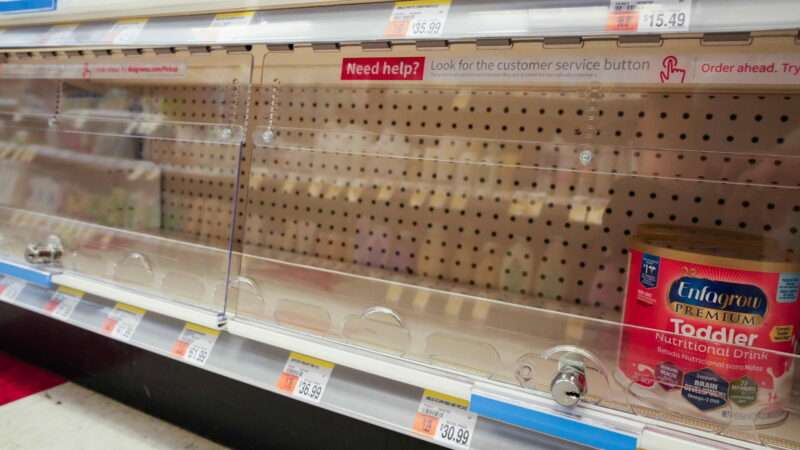
In the midst of a nationwide baby formula shortage, the president has announced seemingly dramatic solutions. Joe Biden on Wednesday invoked the Defense Production Act, a Korean War-era emergency measure that gives the president the authority to force private companies to produce goods and services to support defense efforts.
That’s an unusual use of federal wartime powers given the United States is not currently at war—well, beyond our usual support for simmering not-quite wars in the Middle East and elsewhere. The formula shortages are understandably frightening for young mothers, but they in fact have nothing to do with the nation’s defense.
Biden also launched “Operation Fly Formula,” which as the name suggests directs the U.S. military to use its planes to fly formula from other countries to the United States. Once overseas formula lands on U.S. soil, the federal Food and Drug Administration (FDA) has actually agreed to loosen its binders of rules regarding formula content, labeling and sale.
The agency will “consider whether to exercise enforcement discretion and the extent of that enforcement discretion…. For example, an infant formula whose label does not list the nutrients in the order required … would need an exercise of enforcement discretion regarding that particular labeling requirement, and FDA may determine that enforcement discretion is appropriate.”
So, if enough American babies are hungry, FDA bureaucrats might—at their sole discretion, of course—let Canadian and German formula makers sell their products to Americans even if they label the ingredients out of the proper order. It’s progress, anyway.
Baby formula has become scarce after an Abbott Nutrition facility in Michigan closed following a bacterial contamination that resulted in a recall of its powdered product. The feds essentially forced the plant to shut down after they found traces of bacteria at the plant following four illnesses among infants (two of whom died).
That’s a serious concern, but as the Associated Press reported, “it’s not certain the bacteria came from the plant; strains found at the plant didn’t match the two available samples from the babies.” Such bacteria can come from a variety of places—homes and not just factories. Furthermore, the AP added that bacteria traces were “not in areas used to make the powder.”
We’ll see how the investigation plays out, and whether a federal re-opening agreement with the company will finally get the supply chain moving again. Meanwhile, Democrats, such as Rep Rose DeLauro (D–Conn.), are milking the situation politically by demanding additional funding for FDA inspectors and other industry regulations. DeLauro has been blasting the manufacturers.
Such political posturing won’t fix the supply situation and likely will make it harder for companies to ramp up operations to fill the void. Policymakers should be encouraging production rather than attacking it. They should reform the notoriously bureaucratic FDA, which has long delayed the release of life-saving drugs and other necessary products.
“The U.S. produces 98 percent of the baby formula American parents buy,” a CNBC report explained. “Four manufacturers—Abbott, Mead Johnson Nutrition, Nestle USA and Perrigo—dominate the market. When one plant goes offline, the supply chain is easily disrupted.” That’s true, but the network doesn’t explain why Americans are so dependent on four companies.
How about this? Thanks to union-friendly Democrats and “Buy American” Republicans, our nation imposes a crazy patchwork of tariffs and trade rules that limit the availability of formula from other countries, including those with state-of-the-art manufacturing standards.
The Cato Institute’s Gabriella Beaumont‐Smith notes that the United States imposes tariffs up to 17.5 percent (plus additional duties) on overseas formula manufacturers—something that keeps non-American companies from competing in our market. The administration is suddenly eager to airlift the once-verboten foreign products.
There’s another way the government created this shortage. Many formula buyers are low-income women who receive subsidies via the Women, Infants and Children program. “In 1989, Congress, hoping to keep WIC’s costs down, passed legislation requiring states to use competitive bidding to select one manufacturer of infant formula to be covered by WIC,” Time’s Abby Vesoulis explained.
Markets are amazing. Through Scottish economist Adam Smith’s “invisible hand,” supply and demand stay in equilibrium thanks to a spontaneous system of pricing and incentives. This happens without central direction. Indeed, economies where “experts” direct economic decisions are mainly known for bread lines and famines (not to mention gulags).
Governments can’t plan economies, but can disrupt them. They can impose many regulatory barriers that limit firms’ ability to respond quickly to changing market conditions. Those rules destroy a market’s resilience, which is what’s happening with baby formula. It’s also what’s happened with supply chains after governments derailed the economy over COVID.
When you hear politicians promising to solve this formula crisis with military aircraft, chalk it up to the usual political “Pablum.” It’s a term that now means “bland or insipid intellectual fare” and ironically was inspired by tasteless, processed baby cereal.
This column was first published in The Orange County Register.
The post There's No Political Solution to the Baby Formula Shortage appeared first on Reason.com.
from Latest https://ift.tt/ZbQHAFB
via IFTTT